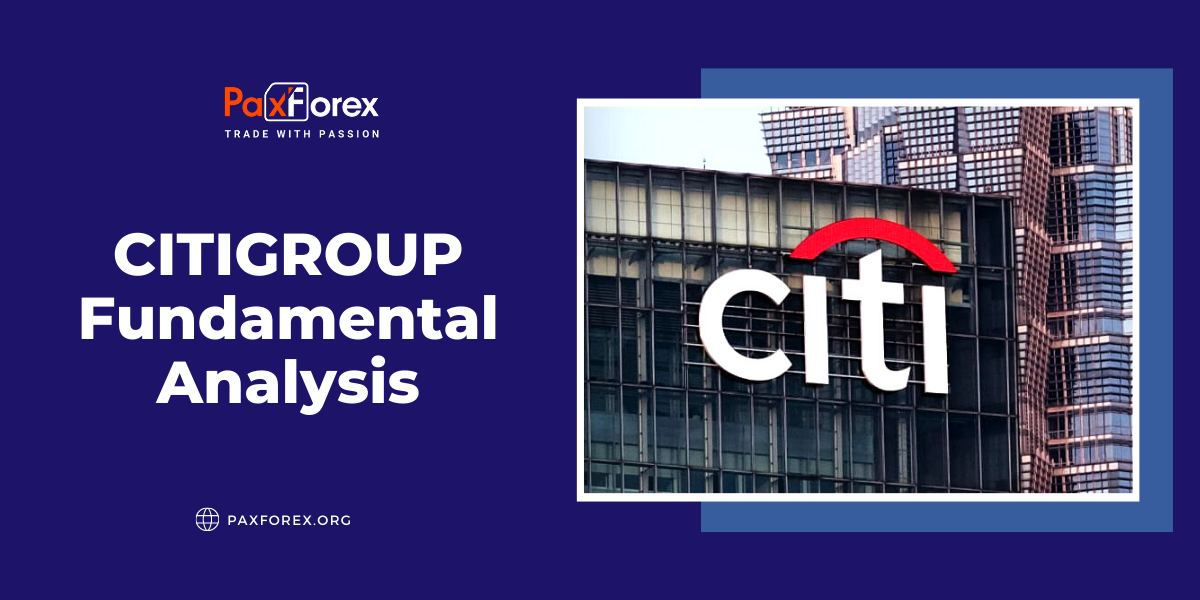
Source: PaxForex Premium Analytics Portal, Fundamental Insight
It's been an extremely miserable year for Citigroup in terms of stock price performance, with shares down about 1% this year. The KBW Nasdaq Banking Index, which tracks big bank stocks, is up nearly 35% this year, indicating just how far Citigroup has fallen behind the broader sector. Trading at battered levels, can Citigroup turn the tide in 2022? Let's break it down.
Citigroup faces some challenges in 2021. The bank, which has lagged behind its competitors since the Great Recession, got into trouble in 2020 when it accidentally sent $900 million to the wrong parties because of a clerical error that showed a lack of modernization at the bank. Later that year, regulators fined Citigroup $400 million and issued a cease-and-desist order, instructing management to address long-standing weaknesses related to internal compliance, data, and risk management. Then-Citigroup CEO Michael Corbat also declared his retirement last year, which surprised many who thought he still had a few years to spare.
In early 2021, Jane Fraser took the helm at Citigroup and began updating the bank's strategy. She began promisingly, announcing significant changes to the bank's global strategy, in which the bank would sell or exit 13 global franchises that lacked the scale to compete. As part of the update, Fraser also said that Citigroup would continue to invest in those franchise business segments that were already generating good returns and focus on non-capital-intensive businesses such as wealth management, especially in Citigroup's international presence.
Investors seemed pleased with the first steps, but Fraser's successful start quickly came to naught in the second half of the year as the bank's costs rose and market conditions became tougher. The bank sold its Australian consumer banking division and posted a pre-tax loss of $680 million in the third quarter. Citigroup then announced that it would be winding down its Korean consumer banking unit, which could result in costs of up to $1.5 billion. The sale frees up capital, and it's unclear whether Citigroup had any sense to wait for these moves, though it's unlikely that's what investors were expecting.
One more big disappointment came lately when Citi Chief Financial Officer Mark Mason said at a recent conference call that the bank had suspended share repurchases this quarter because of a new capital regulation that requires some banks to increase risk-weighted assets and therefore increase capital. This is especially frustrating because Citigroup is now trading $60 a share, which is only 75% of book value (TBV). At these levels, share buybacks would boost the TBV relative to which banks trade, so a higher TBV usually favors bank stocks in the long run. This is a rare opportunity that Citigroup should take advantage of by buying back as many shares as possible and continuing to invest in the business.
It's not really clear why Citigroup stock is trading at such low levels, and it's unclear how much lower they might go. Most likely, the drop in the stock price is a demonstration of market disappointment with these stocks over the years, but Citigroup has one of the strongest investment banking divisions in the world and holds 4% of the total deposit market share in the United States. These advantages are not easy to replicate and should be worth more than Citigroup's current valuation. Of course, the bank still has a lot of work to do, including upgrading its infrastructure to meet regulatory mandates.
Nonetheless, management has provided a blueprint for a transformation plan that looks promising. Citigroup plans to sell off inefficient businesses within its sprawling franchise and redouble efforts in areas such as treasury and trading solutions that can generate outstanding revenue. The wealth management area also looks optimistic since Citigroup already has such a large international presence.
Mason said the stock buyback will resume in Q1 next year, and it has already helped boost Citigroup's TBV per share to $79. At the current price of about $60 a share, that means 34 percent upside just to get back to TBV, which is half that of competitors such as JPMorgan Chase and Bank of America. As long as the transformation plan is in place, Citigroup can buy back shares and continue to grow TBV significantly. At the current price, the bank's dividend yield is more than 3.4%, so you can't say investors aren't rewarded for their patience.
Citigroup's transformation will likely take several years, but the bank will hold an investor day in March. That should give investors and analysts a more detailed view of the updated strategy, as well as renewed faith in management. A potential interest rate hike next year might do the bank some good, but I think the stock buyback, investor day, and implementation of the transformation are more important. Eventually, the hope is that Citigroup stock can return to 100% TBV in 2022, which would be about $80 per share and represent significant upside potential.
As long as the price is above the 58.30 level, follow the recommendations below:
- Time frame: D1
- Recommendation: long position
- Entry point: 60.55
- Take Profit 1: 63.40
- Take Profit 2: 64.70
Alternative scenario:
If the level of 58.30 is broken-down, follow the recommendations below:
- Time frame: D1
- Recommendation: short position
- Entry point: 58.30
- Take Profit 1: 56.10
- Take Profit 2: 54.80













